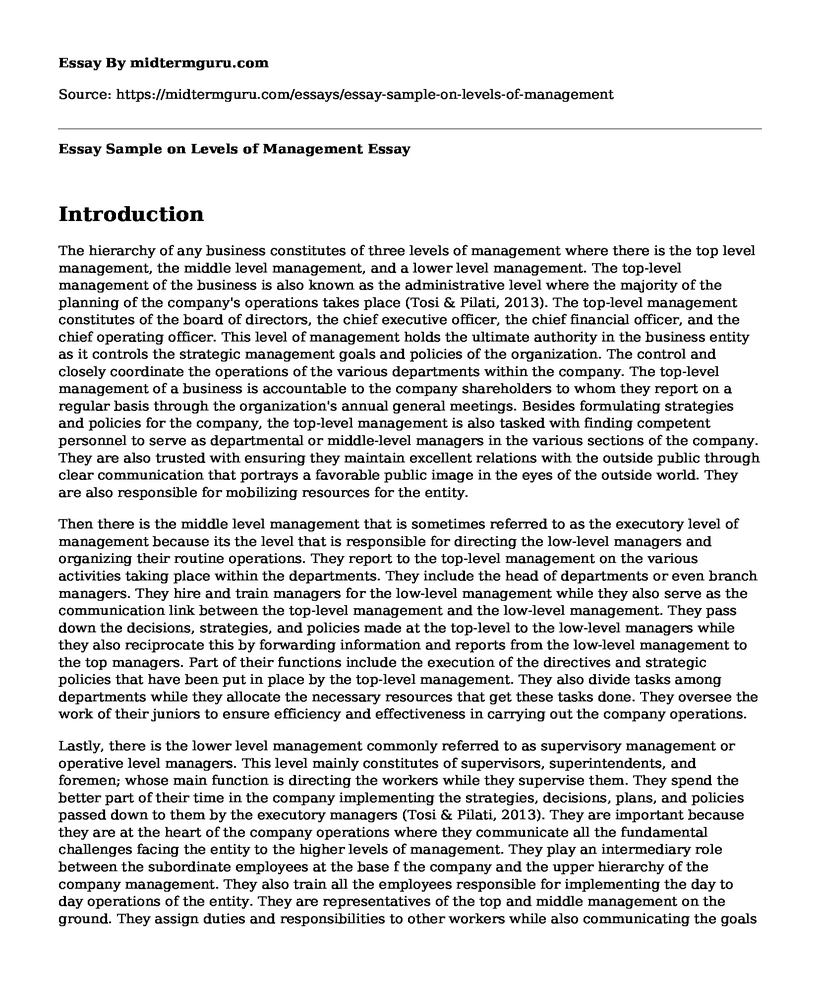Introduction
The hierarchy of any business constitutes of three levels of management where there is the top level management, the middle level management, and a lower level management. The top-level management of the business is also known as the administrative level where the majority of the planning of the company's operations takes place (Tosi & Pilati, 2013). The top-level management constitutes of the board of directors, the chief executive officer, the chief financial officer, and the chief operating officer. This level of management holds the ultimate authority in the business entity as it controls the strategic management goals and policies of the organization. The control and closely coordinate the operations of the various departments within the company. The top-level management of a business is accountable to the company shareholders to whom they report on a regular basis through the organization's annual general meetings. Besides formulating strategies and policies for the company, the top-level management is also tasked with finding competent personnel to serve as departmental or middle-level managers in the various sections of the company. They are also trusted with ensuring they maintain excellent relations with the outside public through clear communication that portrays a favorable public image in the eyes of the outside world. They are also responsible for mobilizing resources for the entity.
Then there is the middle level management that is sometimes referred to as the executory level of management because its the level that is responsible for directing the low-level managers and organizing their routine operations. They report to the top-level management on the various activities taking place within the departments. They include the head of departments or even branch managers. They hire and train managers for the low-level management while they also serve as the communication link between the top-level management and the low-level management. They pass down the decisions, strategies, and policies made at the top-level to the low-level managers while they also reciprocate this by forwarding information and reports from the low-level management to the top managers. Part of their functions include the execution of the directives and strategic policies that have been put in place by the top-level management. They also divide tasks among departments while they allocate the necessary resources that get these tasks done. They oversee the work of their juniors to ensure efficiency and effectiveness in carrying out the company operations.
Lastly, there is the lower level management commonly referred to as supervisory management or operative level managers. This level mainly constitutes of supervisors, superintendents, and foremen; whose main function is directing the workers while they supervise them. They spend the better part of their time in the company implementing the strategies, decisions, plans, and policies passed down to them by the executory managers (Tosi & Pilati, 2013). They are important because they are at the heart of the company operations where they communicate all the fundamental challenges facing the entity to the higher levels of management. They play an intermediary role between the subordinate employees at the base f the company and the upper hierarchy of the company management. They also train all the employees responsible for implementing the day to day operations of the entity. They are representatives of the top and middle management on the ground. They assign duties and responsibilities to other workers while also communicating the goals and agenda of the company to the operative workers. Besides instructing the employees on what to do, they also make periodic reports to the management teams at the higher levels.
Reference
Tosi, H., & Pilati, M. (2013). Managing organizational behavior: Individuals, teams, organization and management. Cheltenham, U.K: Edward Elgar.
Cite this page
Essay Sample on Levels of Management. (2022, Sep 19). Retrieved from https://midtermguru.com/essays/essay-sample-on-levels-of-management
If you are the original author of this essay and no longer wish to have it published on the midtermguru.com website, please click below to request its removal:
- Project Failure Reflection Blog - Paper Example
- Essay Methods of Assessing the Risk: Chemical Hazards
- Essay on Performance Measurement Methods
- Tesco PLC Analysis Paper Example
- Management Essay Sample on Motivation: Theories and Practices
- Self-Actualization: Maslow's Theory of Motivation and Social Justice - Essay Sample
- Nurse Leadership: Essential Competencies for Success in Healthcare - Essay Sample







